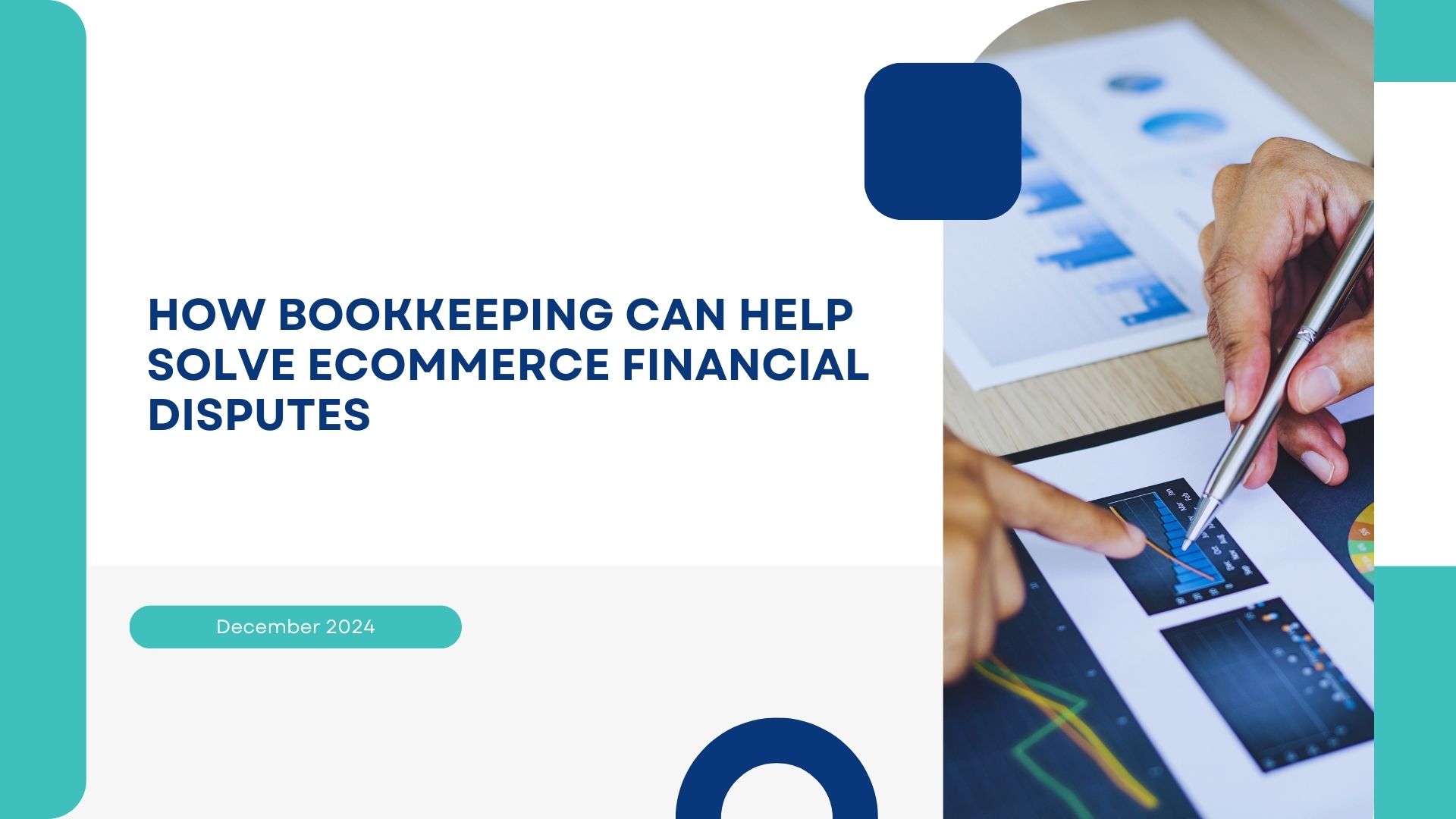How Bookkeeping Can Help Solve Ecommerce Financial Disputes
Financial conflicts in the fast-paced world of e-commerce can originate from a number of factors, such as arguments with customers, suppliers, or tax authorities. Accurate and easily available financial records are necessary for navigating these disagreements, which is where e-commerce bookkeeping becomes a vital tool. By maintaining organized records and leveraging online accounting tools, ecommerce businesses can resolve disputes efficiently, preserve trust, and avoid unnecessary financial losses.
Why Financial Disputes Arise in Ecommerce
Ecommerce businesses face unique challenges that can lead to financial disagreements. These include:
- Order Discrepancies: Customers disputing charges due to incorrect shipments or unfulfilled orders.
- Supplier Payment Issues: Disagreements over invoices, payment terms, or delivery timelines.
- Tax Compliance: Errors in sales tax reporting leading to disputes with tax authorities.
- Chargebacks: Disputes initiated by customers through credit card companies.
Without clear and accurate financial records, resolving these issues can be time-consuming and costly. Implementing robust bookkeeping for ecommerce practices ensures that businesses have the data they need to defend their position and resolve disputes effectively.
The Role of Bookkeeping in Resolving Ecommerce Financial Disputes
1. Providing Accurate Financial Records
Accurate data is the cornerstone of every dispute settlement process. Every transaction, whether it be one involving revenue, expenses, or taxes, is guaranteed to be methodically documented by bookkeeping. Businesses can spot inconsistencies and confidently handle disagreements because to this transparency.
2. Documenting Proof of Transactions
A well-maintained trail of invoices, receipts, and payment records is essential in the event of a disagreement with clients or suppliers. For instance, bookkeeping records can offer conclusive evidence of the date and method of payments in the event that a supplier alleges non-payment.
3. Ensuring Tax Compliance
Sales tax disputes are common in ecommerce, especially for businesses operating across multiple states or countries. Proper bookkeeping categorizes and tracks sales tax liabilities, ensuring that businesses can provide accurate reports during audits or disputes with tax authorities.
4. Supporting Chargeback Defense
Chargebacks can negatively impact the financial performance of an online retailer. Businesses that maintain proper bookkeeping can refute unauthorized chargebacks by providing documentation of valid transactions, such as payment receipts and delivery confirmations.
5. Facilitating Clear Communication
By arranging information in an understandable manner, bookkeeping promotes transparency. This makes it easier to communicate with all parties involved in a disagreement, including suppliers, customers, and tax authorities.
Leveraging Online Accounting for Dispute Resolution
In order to manage and settle financial conflicts in e-commerce, modern online accounting solutions are essential. The efficiency of bookkeeping procedures is increased by features like automated reporting, real-time tracking, and connectivity with sales systems.
Key Benefits of Online Accounting:
- Centralized Records: Integrate data from multiple sales channels into one platform for easy access.
- Automation: Reduce errors by automating invoicing, tax calculations, and bank reconciliations.
- Searchable Database: Quickly retrieve specific transactions or reports to address disputes.
- Audit Trails: Maintain a clear history of changes made to financial records, useful in legal or tax-related disputes.
Because of their effectiveness and dependability, well-known programs like FreshBooks, Xero, and QuickBooks Online are frequently used for e-commerce bookkeeping.
Steps to Prevent and Address Ecommerce Financial Disputes with Bookkeeping
1. Implement Robust Record-Keeping Practices
Ensure that every financial transaction is recorded accurately and categorized appropriately. Use online accounting software to automate and simplify this process.
2. Reconcile Accounts Regularly
Frequent account reconciliation ensures that records align with bank statements, reducing the risk of errors that can lead to disputes.
3. Use Detailed Invoices
Always issue clear and detailed invoices to customers and suppliers, including item descriptions, quantities, payment terms, and due dates.
4. Monitor Sales Tax Obligations
Stay informed about sales tax laws in your operating regions. Use automated tools to calculate, collect, and remit taxes accurately.
5. Prepare for Disputes Proactively
Anticipate potential disputes by maintaining thorough documentation of orders, payments, and communications with stakeholders.
Benefits of Bookkeeping for Ecommerce Dispute Resolution
1. Time and Cost Savings
Resolving disputes can be time-consuming and expensive without proper documentation. Accurate bookkeeping ensures quick access to necessary records, reducing resolution time.
2. Improved Customer Trust
By resolving disputes efficiently, businesses can maintain a positive relationship with their customers, fostering trust and loyalty.
3. Avoiding Legal Penalties
Proper tax reporting and compliance through diligent bookkeeping help ecommerce businesses avoid penalties or legal challenges.
4. Data-Driven Insights
Beyond dispute resolution, bookkeeping provides insights into operational inefficiencies that may be contributing to recurring disputes.
5. Scalability and Stability
A strong bookkeeping foundation enables businesses to scale confidently, knowing that their financial operations are well-managed.
Conclusion
Although financial conflicts will inevitably arise when operating an e-commerce business, they don’t have to cause operational disruptions. Businesses can resolve conflicts effectively and confidently by utilizing online accounting tools and putting into practice efficient bookkeeping for e-commerce procedures. Trust and financial stability are maintained when disagreements are settled amicably and quickly thanks to accurate documentation, proactive planning, and a dedication to openness.
FAQs
- How does bookkeeping help with ecommerce chargebacks?
Bookkeeping provides documentation such as payment receipts and shipping confirmations, which can be used to contest unjustified chargebacks. - What tools are best for ecommerce bookkeeping?
Popular tools like QuickBooks Online, Xero, and FreshBooks are ideal for managing ecommerce bookkeeping efficiently. - How can I avoid tax disputes in ecommerce?
Accurate bookkeeping ensures proper categorization of sales tax liabilities, and using automated tax tools helps calculate and remit taxes correctly. - Why is account reconciliation important in ecommerce?
Regular reconciliation ensures that your financial records match bank statements, reducing errors and minimizing the risk of disputes. - Can bookkeeping help resolve disputes with suppliers?
Yes, detailed records of invoices, payments, and communications provide clear evidence to address disagreements with suppliers.









